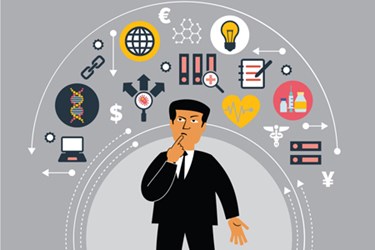Technology Companies Set To Disrupt Healthcare
By Alexander Myskiw, Business Development — Healthcare and Life Sciences, DataArt

Healthcare is struggling to utilize innovative technologies to improve population health, patient experience, outcomes, and data safety because hospitals are slow to adopt. Most hospitals are still trying to make sense of EHRs and have concerns such as interoperability and patient data safety.
The healthcare tech industry is projected to grow by 13.4 percent annually by 2020 and it looks like the top technology companies are noticing the market’s potential. Amazon, Google, Apple, and even Microsoft have started to enter the healthcare industry and have the financial resources, technology expertise yet only soft competition.
Let’s face it: Current technology companies in the industry will be facing an uphill battle once the giants of the tech world decide to tackle the healthcare and life sciences industries. The Fortune 500 top tech companies have the resources and capabilities to help the industry resolve its problems.
Apple and Amazon (Secret 1492 Lab) are planning to target EHRs and telemedicine and it is only a matter of time before they expand into every crevice of the industry. Google’s introduction into the industry, a company called Alphabet, is investing in companies like Calico, DeepMind, and Verily. Alphabet is already disrupting the industry with technologies like smart contact lenses (Verily and Alcon), an Artificial Intelligence (AI) with imagination (DeepMind), and even a drug that reverses brain damage and restores memories (Calico). These projects represent the efforts of only one technology giant and their two-year-old venture. Not bad! Now imagine an industry where Google, Apple, Microsoft, and Amazon strive to out-innovate each other creating technologies that improve customers’ health.
Improving population health is the main goal for the industry and EHRs were supposed to be the solution since the government started using them in the 1970’s. Almost 40 years later the Health Information Technology for Economic and Clinical Health Act (HITECH), part of the American Recovery and Reinvestment Act of 2009, was motivating healthcare providers to meet the “meaningful use” criteria. The rewards provided for meeting the criteria meant healthcare providers got paid for proper data entry. This had the effect of turning the medical professionals into data-entry specialists yet did little to ensure that data is effectively utilized.
EHRs are not there yet, however the community of data savvy medical professionals and the news that Amazon and Apple plan to focus on EHRs means that a simple, user friendly, safe and interoperable solution is coming. EHRs developed by the likes of Apple will allow medical professionals to focus more on the patient health and less on the data entry. The industry is in need of companies like Amazon and Google (who are leaders in collecting and analyzing customer data and using it to better serve them) to build an EHR that is easy to use, interoperable, and safe.
The healthcare industry has always been slow to develop and the continuous debate on patient data safety and interoperability are perfect examples. What is astounding is that we currently have a technology — blockchain — which could make all patient data decentralized (interoperable), anonymous and safe, solving the two major issues within the industry. The technology is already successfully implemented in Estonia’s healthcare system and currently being utilized by DeepMind in their Verifiable Data Audit tool.
The fact that a secure data storage and transfer technology already exists but is not yet being adopted supports the idea that hospitals are slow to adopt and should focus on embracing current technologies rather than searching for the next innovation. Innovations like Artificial Intelligence, Nanotechnology, and robotics might be shiny new toys for the tech community, but they are years away from adoption. Instead, EHRs should be the focus and the foundation for improving population health outcomes and yet usually are just a place where data gets gathered rather than analyzed and turned into a real-time lifesaving decision support.
Hospitals and life sciences companies have resorted to outsourcing and have become complacent, developing acceptable rather than innovative solutions. For the population to truly benefit from an EHR, the user interface (UI) must be of high quality and the user experience (UX) must engage the target audience in the ecosystem of their health. Imagine an EHR that updates instantly, scores personal health using real-time statistics, provides doctors with real-time data and most importantly presents the user experience your health deserves.
Current healthcare technology companies will face a new bar, set to push industry competition to new heights. Where competition flourishes, innovation follows, weeding out the soft competitors and breeding innovators. Doctors need to be able to input patient data with ease, use real-time statistics to diagnose, and use daily wearables and telemedicine solutions to inform proposed treatments and provide preventative health suggestions. Let’s not forget about the current market players, who will need to beef up on R&D and prepare to innovate. Technologies that predict heart attacks, home diagnosis kits and even AI that helps post-stroke gait recovery are all thirsty for an EHR that can interpret the data, track and inform the patient on their progress, with just a swipe of a finger. The healthcare landscape is about to change drastically and the technology giants are going to lead the way.
